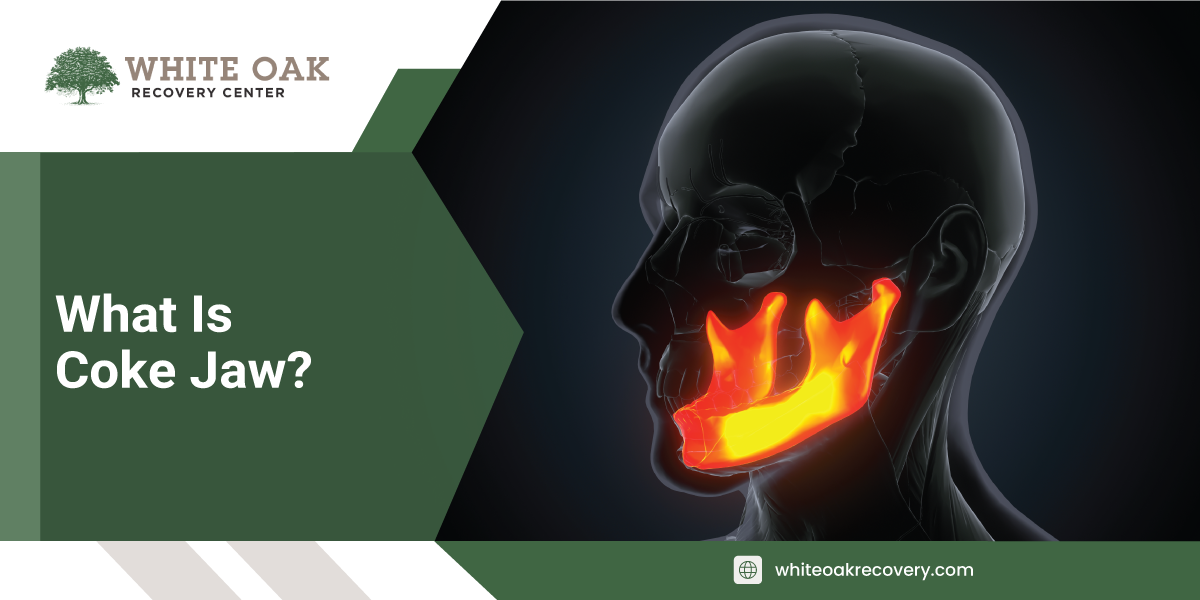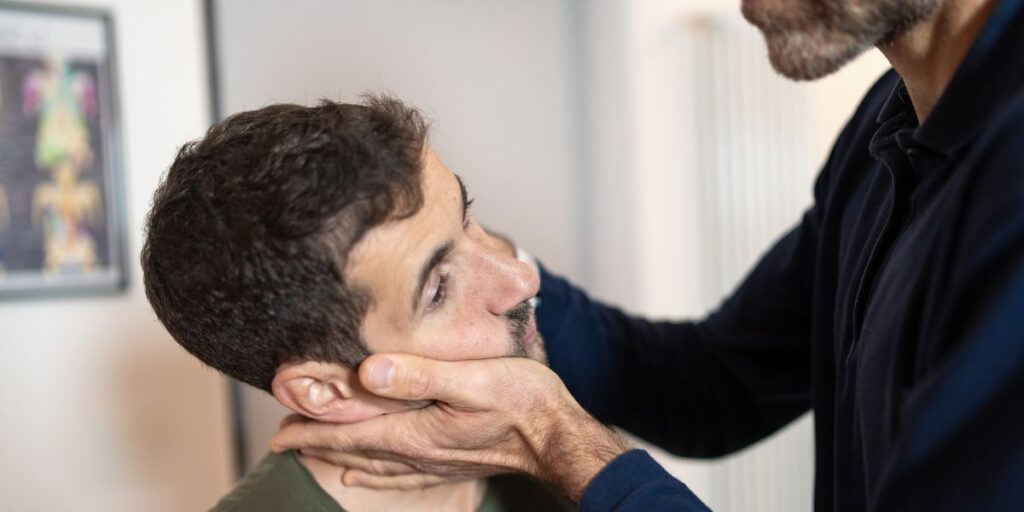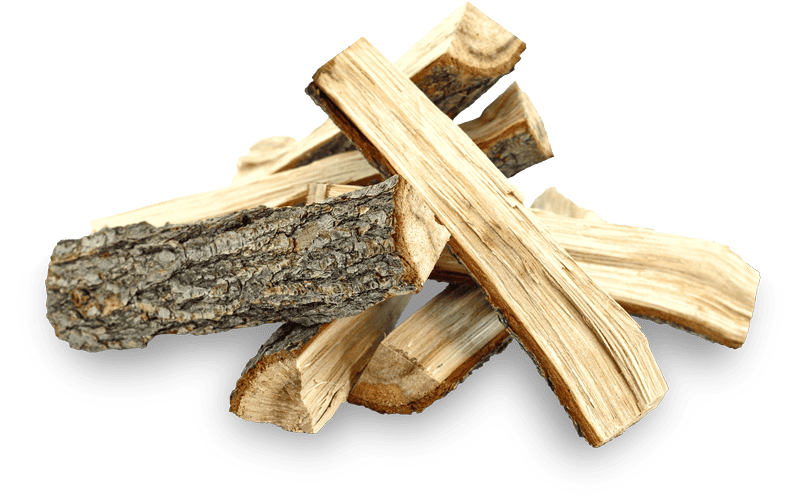What Is Coke Jaw?


Medical Writer:
Reviewer:

Johnny Kim
Executive Psychotherapist
Medical Writer:
Reviewer:

Johnny Kim
Executive Psychotherapist
Cocaine, a powerful and illicit stimulant, has long been recognized for its devastating effects on the mind and the body. While it creates a temporary euphoria and increased energy, these short-lived highs have severe health consequences.
Among the many dangers associated with cocaine use is a lesser-known but increasingly concerning condition called “coke jaw.” This condition involves involuntary movements of the jaw and other oral health complications, highlighting the severe impact of cocaine on physical health.
Table of Contents
ToggleCoke jaw is a direct result of cocaine abuse and the drug’s stimulant effects, which cause the jaw muscles to contract uncontrollably. Over time, these repetitive movements can damage the teeth, temporomandibular joint (TMJ), and overall oral health.
The symptoms of coke jaw are not only painful but also serve as a stark reminder of the wide, often hidden dangers of cocaine addiction. Many people know about cocaine’s well-known dangers, like heart problems and coke addiction. However, its effects on oral health, especially conditions like coke jaw, deserve more attention.
What Is Cocaine Jaw?
Cocaine jaw, or “coke jaw,” is a condition that arises from chronic cocaine use. It is characterized by involuntary jaw movements, such as clenching and grinding, mainly caused by the drug’s intense effects on the central nervous system. These movements can be so severe that they lead to long-term damage to the teeth and jaw, making coke jaw one of the more severe and visible signs of cocaine abuse.
Key characteristics of coke jaw include:
- Involuntary jaw movements
- Grinding and clenching of teeth
- Damage to the TMJ and dental health
Coke jaw is not just a superficial side effect of cocaine use; it is a manifestation of the drug’s severe impact on the body’s musculoskeletal and neurological systems. The repetitive grinding and clenching can lead to enamel erosion, cracks, and tooth loss. Moreover, the condition often exacerbates existing dental problems, creating a cycle of worsening oral health that can be difficult to break without professional intervention.
Cocaine users might not initially realize the connection between their drug use and the onset of these symptoms. However, as the condition progresses, the physical toll becomes increasingly apparent, affecting the person’s oral health and overall quality of life. The pain and discomfort associated with coke jaw can interfere with daily activities such as eating, speaking, and sleeping, further contributing to the user’s physical and emotional decline.

What Causes Coke Jaw?
The development of coke jaw is intricately linked to the physiological effects of cocaine on the body. Cocaine’s stimulant properties are the primary cause, directly influencing the muscles and nerves, particularly in the jaw area. However, several underlying causes contribute to the severity and duration of the infection.
Cocaine’s primary effect is on the central nervous system, where it increases dopamine levels, leading to euphoria and increased energy. This surge in dopamine creates a heightened state of arousal and activity in the body, including involuntary muscle contraction. In the jaw, this hyperactivity causes clenching and grinding, which are the signs of coke jaw.
The factors contributing to coke jaw:
- Hyperactivity of jaw muscles: The overactivation of jaw muscles during cocaine use results in continuous clenching and grinding, often without the user being fully aware of it.
- Constriction of blood vessels: Cocaine causes blood vessels to narrow, reducing blood flow to various parts of the body, including the muscles and joints in the jaw. This constriction exacerbates muscle stiffness and pain, contributing to the development of a coke jaw.
- Psychological stress leading to clenching: Cocaine use is often associated with heightened anxiety and stress. These psychological factors can cause users to clench their jaws unconsciously, further straining the muscles and joints.
Symptoms of Coke Jaw
Recognizing the symptoms of coke jaw is crucial for early intervention and treatment. The condition manifests through a range of physical signs, each reflecting the underlying damage caused by cocaine use. Early detection can help prevent further damage and lead to more effective treatment outcomes.
Common symptoms include:
- Persistent jaw pain and stiffness
- Uncontrolled jaw clenching and grinding
- Dental problems such as enamel erosion and increased sensitivity
- Temporomandibular joint disorder (TMD)
- Involuntary jaw movements
- Jaw dislocation
- Headaches
- Earaches
- Neck pain
The combination of these symptoms can make daily life extremely challenging, affecting everything from eating to speaking and even sleeping.
The impact of coke jaw on daily life cannot be underestimated. The persistent pain and discomfort can decrease the quality of life, as simple activities such as chewing food or speaking become painful. In severe cases, the pain can be so intense that it interferes with the person’s ability to sleep, leading to fatigue and further compounding the negative effects on their overall health.

Cocaine Addiction Treatment at White Oak Recovery Center
Cocaine addiction is a life-threatening condition that requires professional intervention. At White Oak Recovery Center (WORC), we specialize in helping people overcome drug addiction and its co-occurring mental health disorders. Our comprehensive treatment programs are designed to address both the physical and psychological aspects of addiction, ensuring an intensive and evidence-based approach to recovery.
At WORC, we understand that overcoming cocaine addiction is a complex and challenging process. Our experienced and caring team is committed to providing the highest level of patient care and support to help people reclaim their lives from addiction.
If you or someone close to you is facing challenges with cocaine dependence, it’s crucial to get expert assistance. Contact WORC today to learn more about our treatment options and take the first step towards a brighter, healthier future.

Am I covered for addiction treatment?
Your insurance may cover treatment. Call now for an entirely free and confidential assessment. Recovery starts with a phone call.

- Melo, Cesar Antonio Araujo, et al., “Oral Changes in Cocaine Abusers: An Integrative Review.” Brazilian Journal of Otorhinolaryngology, May 2021.
- Mukit, Tahina, et al., “Cocaine Abuse and Bruxism: Temporal Mandibular Joint Evaluation Using FDG-PET/CT.” The Journal of Nuclear Medicine, Aug. 2022.
- “Teeth Grinding (Bruxism).” NHS England, Jun. 2022.
- Lal, Sona J., et al., “Bruxism Management.” StatPearls: National Library of Medicine, May 2024.
Medical Disclaimer:







